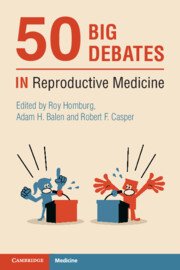Book contents
- 50 Big Debates in Reproductive Medicine
- Series page
- 50 Big Debates in Reproductive Medicine
- Copyright page
- Contents
- Contributors
- Foreword
- Introduction
- Section I Limits for IVF
- Section II IVF Add-ons
- Section III The Best Policy
- Section IV Embryology
- Section V Ethics and Statistics
- Section VI Male-factor Infertility
- Section VII Genetics
- Section VIII Ovarian Stimulation
- 41A AMH Is a Better Predictor of Ovarian Response Than AFC
- 41B AMH Is a Better Predictor of Ovarian Response Than AFC
- 42A Pituitary Suppression Using GnRH Agonist for IVF Is Outdated
- 42B Pituitary Suppression Using GnRH Agonist for IVF Is Outdated
- 43A The Maximum Effective Dose of FSH for Ovarian Stimulation in IVF Is 300 IU
- 43B The Maximum Effective Dose of FSH for Ovarian Stimulation in IVF Is 300 IU
- 44A There Is No Place for Natural and Mild Stimulation IVF
- 44B There Is No Place for Natural and Mild Stimulation IVF
- Section IX Hormones and the Environment
- Index
- References
41A - AMH Is a Better Predictor of Ovarian Response Than AFC
For
from Section VIII - Ovarian Stimulation
Published online by Cambridge University Press: 25 November 2021
- 50 Big Debates in Reproductive Medicine
- Series page
- 50 Big Debates in Reproductive Medicine
- Copyright page
- Contents
- Contributors
- Foreword
- Introduction
- Section I Limits for IVF
- Section II IVF Add-ons
- Section III The Best Policy
- Section IV Embryology
- Section V Ethics and Statistics
- Section VI Male-factor Infertility
- Section VII Genetics
- Section VIII Ovarian Stimulation
- 41A AMH Is a Better Predictor of Ovarian Response Than AFC
- 41B AMH Is a Better Predictor of Ovarian Response Than AFC
- 42A Pituitary Suppression Using GnRH Agonist for IVF Is Outdated
- 42B Pituitary Suppression Using GnRH Agonist for IVF Is Outdated
- 43A The Maximum Effective Dose of FSH for Ovarian Stimulation in IVF Is 300 IU
- 43B The Maximum Effective Dose of FSH for Ovarian Stimulation in IVF Is 300 IU
- 44A There Is No Place for Natural and Mild Stimulation IVF
- 44B There Is No Place for Natural and Mild Stimulation IVF
- Section IX Hormones and the Environment
- Index
- References
Summary
In medically assisted reproduction, markers of ovarian reserve are largely used as predictors of ovarian response with the aim to individualise ovarian stimulation therapy and to counsel patients on reproductive outcome. For several years, serum AMH and ultrasound antral follicle count (AFC) have shown to be the most accurate markers and to be highly correlated. The demonstration of AMH’s major predictive value in one trial and two trials post-hoc analyses lays a first solid foundation for the supremacy of this marker. Other studies are needed, but we think that AMH dosing with new automated assays could only confirm these results.
- Type
- Chapter
- Information
- 50 Big Debates in Reproductive Medicine , pp. 210 - 211Publisher: Cambridge University PressPrint publication year: 2021

